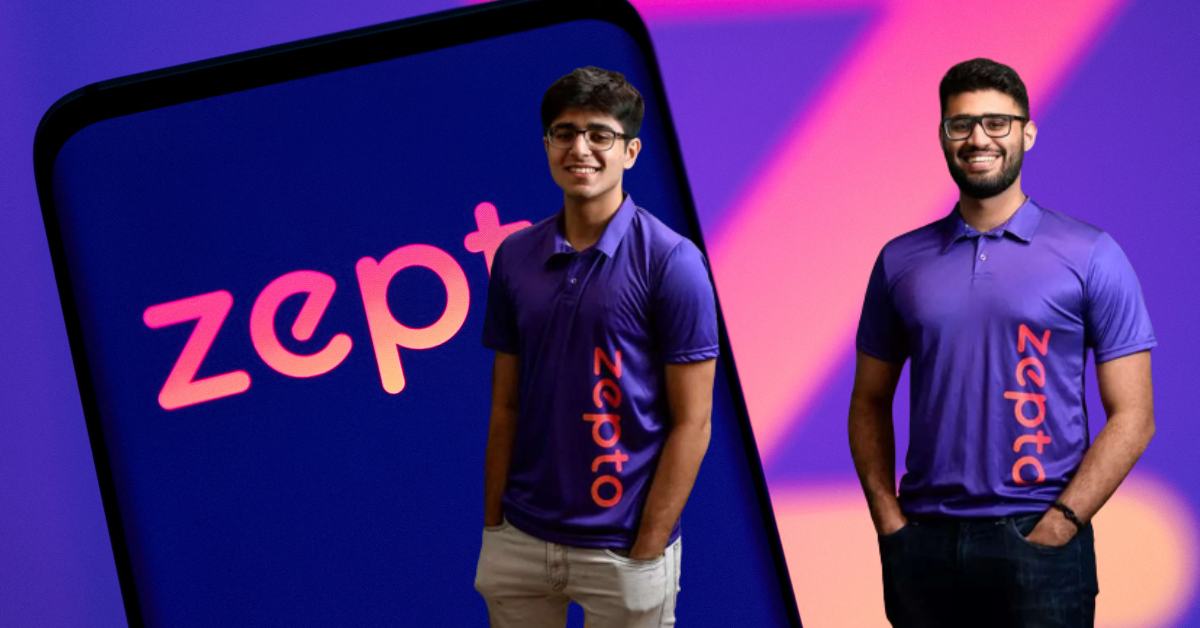Zepto is one of the fastest-growing startups in India today. Six months after launching, they have raised $160 million from Silicon Valley and India marquee investors.
WHO ARE THEY?
Zepto -10 Minutes Grocery Delivery Service is only five months old and has a $570 million market cap. Zepto uses a dark store business concept. Dark stores are distribution centers that aren’t accessible to the public. These mini warehouses make it possible to rapidly and precisely fill orders, giving customers access to resources and choices, including online shopping, same-day delivery, and in-store pickup. The “dark store model” eliminates the minor issues that any delivery service has, such as traffic jams, connectivity, and navigation.
WHEN WERE THEY FOUNDED?
Zepto was formed in 2021 by two Stanford University dropouts. They have had significant success with their online grocery platform Zepto, valued at $900 million, despite being only 19 years old.
WHO ARE THE FOUNDERS?
1. KAIVALYA VOHRA-
Kaivalya Vohra, a 19-year-old businessman, founded Zepto with his partner Aadit Palicha. Zepto is a platform for speedy delivery. In addition to being included on the Hurun India Rich List, the pair was also chosen for Forbes’ prestigious “30 under 30” list (Asia list).
Vohra, born on March 15, 2001, in Bengaluru, Karnataka, attended one of the top private schools in the world, Dubai College, for his education. He founded the CS society at his school, served as the deputy head boy, and was the captain of the U19 basketball team. He is proficient in Hindi, English, and French and excelled in mathematics and computer sciences.
2. AADIT PALI CHA-
In India’s Maharashtra state of Mumbai, Aadit Palicha was born. Palicha attended school in Mumbai, then transferred to Stanford to earn his degree in computer engineering before quitting to launch his own business.
When he was just 17 years old, Aadita started his entrepreneurial path with GoPool. Additionally, he established the AI project PryvaSee, a business that compiled privacy policies.
Zepto was established earlier this year (in 2021) and had been running since April. After obtaining $60 million in an early fundraising round, the firm has amassed a net worth of $200 million to $300 million within months of its establishment. According to media sources, it now delivers over 2,500 goods, including fresh produce, kitchen basics, snacks and beverages, personal care products, and home cleaning supplies.
WHAT PROBLEM IS THE STARTUP SOLVING?
Zepto’s entrepreneurial journey has been fraught with significant difficulties. It was undoubtedly difficult for them to continue operating, but the business did so and is now doing well.
Respecting one another’s dignity and honesty in any team environment is critical. Zepto had to deal with a challenging scenario when there were numerous instances of improper behavior among its investors and creator. To resolve their conflicts, they filed FIRs and appeared in court.
HOW DOES IT WORK?
Zepto operates over 100 “dark stores” or “micro fulfillment centers” in areas with increased demand. These mysterious shops employ technology to carry out operations like product placement. In addition, they plan delivery routes to avoid congested traffic areas and choose the stores’ sites. More than 2500 goods, including groceries, fresh vegetables, toiletries, snacks and drinks, and cleaning supplies, are already being delivered by the company.
WHAT IS THE PREVIOUS EXPERIENCE?
On AmbitionBox, Zepto scored 3.9 out of 5 based on 112 employee ratings. Zepto is well-known for its top-rated skill development feature; The lowest rating is given to job security, which can be raised.
WHAT WAS THE REAL STRUGGLE OF THE STARTUP?
During the epidemic, the founders of Zepto had the concept for the company. Necessities like groceries, which took a few days to arrive, were in high demand. Living alone during the pandemic, Vohra and Palchia found it a big challenge and decided to launch a company that would address it.
Their initial venture, KiranaKart, made grocery shopping simpler while Zepto sped up delivery.
PROGRESS AND CURRENT STATE?
Zepto has grown considerably during the last few months. Following are a few of the company’s key growth drivers:
• The company’s delivery service serves almost all Tier-I cities, including Delhi-NCR, Mumbai, Pune, Bengaluru, Hyderabad, Kolkata, and Chennai.
• Zepto is growing at a rate of more than 200% per month.
• Monthly retention for the business is more than 78%.
• Compared to its last funding round of $60 M, the company has virtually doubled its amount.
• Reputable influential executives from companies like Flipkart, Amazon, Uber, Pharmeasy, Dream11, etc., work for them.
• Every week, Zepto successfully onboards over 100,000 new users to its platform.
WHO ARE THE COMPETITORS OF THE STARTUP?
However, Blinkit, another software, poses a severe threat to the Zepto app in India. Softbank Group Corporation is supporting the startup in question. Zepto also needs to contend with Dunzo, which Google supports. The Naspers Limited-supported Swiggy’s Instamart is one example. Flipkart is sponsored by Walmart Inc. and businesses like Amazon.com Inc. However, according to CEO Palicha, the industry of Zepto is expanding quickly and has good core unit economics.
WHAT IS THE FUNDING REQUIRED FOR THE STARTUP ?
Zepto just got more funding, barely 45 days after raising $60 million at a $225 value. The CEO and co-founder of Zepto, Aadit Palicha, disclosed this information during one of his interviews. The Zepto business model attracted investments from established and up-and-coming players, including Nexus Venture Partners, Glade Brook Capital Partners, Breyer Capital, and a Silicon Valley investor named Lachy Groom, in addition to a sizable contribution from Y Combinator’s continuity fund.
WHAT IS THE REVENUE AND BUSINESS MODEL OF THE STARTUP?
The typical delivery minute for the business is 8.47 minutes. They can accommodate significant digital purchases because of their numerous hotspot strategies. Zepto optimizes several variables when distributing its products, including topography, traffic patterns, weather, real estate values, population, and last-mile supply availability.
Zepto uses the commission-based revenue model. It has partnerships with several retailers and small business owners for grocery delivery in the neighborhood. Zepto charges the retailers a certain proportion of commission on these orders. Depending on how much the order is worth, the commission rate varies. Additionally, the business assesses a delivery fee that is less than the required minimum.
WHAT IS NEXT FOR ZEPTO?
With its business model, Zepto recruits and makes an effort to keep employees. Let’s say someone is just beginning to use Zepto delivery. In that situation, based on the person’s location, the Zepto app guarantees a delivery window of seven to ten minutes.
Another incentive offered to customers is a discount of up to 50% and free delivery, which can range from 25% to 30%. Zepto Delivery burns some cash once or twice to attract and keep clients. In contrast, its rivals frequently burn through cash by giving significant discounts to successful customers. The final feature that sets Zepto apart from its competitors is that they pay its delivery personnel salaries rather than commissions.
BRIEF ABOUT THE TEAM AND TEAM BUILDING OF ZEPTO
Zepto, which has its headquarters in Mumbai, employs more than a thousand people throughout ten of the largest cities in the nation and provides 3000+ products, such as fresh produce, dairy, household goods, and products for health and hygiene, among others, to Indian homes in less than ten minutes.
CONCLUSION
It takes a strong team, quick thinking, and razor-sharp focus to be Zepto. Additionally, it entered the supermarket delivery area at an excellent time. Even though Zepto is only a 5-month-old business, any forecast is subject to error. But it is undeniable that it has increased client expectations, and they strive to become a more client-focused organization.

